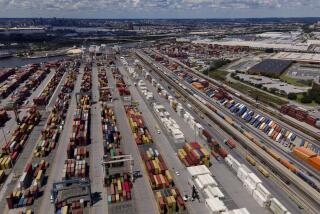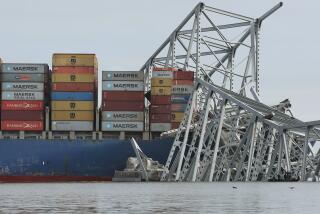China’s slowing growth cause for concern at ports, trade economist says
Trade with China helped build the ports of Los Angeles and Long Beach into an economic powerhouse in recent decades. The flow of goods across the Pacific supports well-paying jobs on the docks and has turned the Inland Empire into an epicenter of warehousing.
But China’s economic growth is slowing and concerns over the world’s second-largest economy have unnerved investors, leading to wild stock market swings in recent weeks.
So what does the subdued growth rate mean for a port complex that last year handled nearly $200 billion in goods from or bound to China, making the country its largest trading partner?
We asked international trade economist Paul Bingham of Economic Development Research Group Inc. for his thoughts. Here are some excerpts from the discussion.
Given the outsized role that China plays at the ports, is there cause for concern?
Concern is clearly warranted. This is their biggest customer. If we are running a business as a region and our biggest overseas customer is in trouble financially, we have to be concerned what is going to happen.
What impact is there likely to be on port traffic?
Imports may actually increase slightly as prices for some goods are made more competitive with the decline in the Chinese currency compared to the dollar, allowing [U.S.] consumers and businesses to purchase more for the same amount of money.
How about exports? Will they be affected differently?
They are going to decline. There is a proportion of that export trade which will see sharp declines in demand from consumers and businesses in China.
Because Los Angeles and Long Beach primarily handle imports, doesn’t that lessen any potential negative impact relative to other ports?
By all means. If you are sitting there in Oakland, with a greater proportion of exports, you are in a much more vulnerable position.
So might L.A. and Long Beach ports see faster overall growth since imports stand to rise?
No, because there are impediments to growth in that trade. The U.S. has already been purchasing as much as it wants to, or is practical. So there isn’t a lot of upside without a substantially faster growing U.S. economy. It looks like the most likely scenario is for trade volumes to grow more slowly than they have been growing up until now.
If the growth rate of cargo volumes does slow, what impact will that have for the Southern California economy?
It’s still positive. It’s a net addition to wages, employment, tax revenues but at a slower growth rate. It’s not a negative story, it’s just the expectations for the improved health of the economy are reduced.
Some shippers sent cargo directly to the East Coast during the labor strife at West Coast ports this year. What effect might this slowdown have on diversion to other ports?
In the short term, it actually probably slows the potential for additional diversion. Someone on the fence, who hasn’t made [the decision to divert], now with the uncertainty in the markets is probably unlikely to say “This is a great time to change my supply chain and let’s try and experiment.”
andrew.khouri@latimes.com







